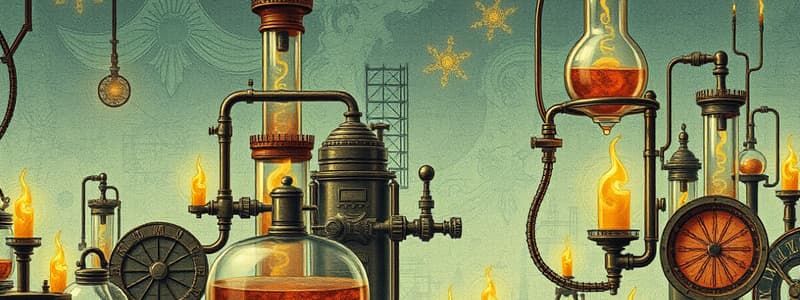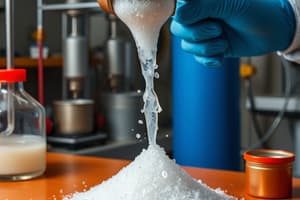Podcast
Questions and Answers
What distinguishes chemical engineers from other types of engineers?
What distinguishes chemical engineers from other types of engineers?
- They only use physical sciences.
- They primarily work in the field of economics.
- They apply knowledge of chemistry in addition to other engineering disciplines. (correct)
- They focus solely on mechanical engineering.
What major shift occurred in chemical production during the Industrial Revolution?
What major shift occurred in chemical production during the Industrial Revolution?
- From batch processing to continuous processing. (correct)
- From chemical to mechanical engineering processes.
- From continuous processing to batch processing.
- From renewable resources to non-renewable resources.
Which institution first offered a course in 'chemical engineering' in 1885?
Which institution first offered a course in 'chemical engineering' in 1885?
- Central College, later known as Imperial College. (correct)
- Massachusetts Institute of Technology (MIT).
- Harvard University.
- University College London.
What is one of the significant achievements of chemical engineers in processing crude oil?
What is one of the significant achievements of chemical engineers in processing crude oil?
Which of the following sciences is NOT typically utilized by chemical engineers?
Which of the following sciences is NOT typically utilized by chemical engineers?
Which synthetic fiber was first extruded in 1939?
Which synthetic fiber was first extruded in 1939?
What is one of the grand challenges in the field of chemical engineering?
What is one of the grand challenges in the field of chemical engineering?
Which of the following is NOT a professional activity in chemical engineering?
Which of the following is NOT a professional activity in chemical engineering?
Which material balance principle is essential in chemical engineering?
Which material balance principle is essential in chemical engineering?
What type of products have chemical engineers developed in the field of medicine?
What type of products have chemical engineers developed in the field of medicine?
Flashcards
Chemical Engineering Definition
Chemical Engineering Definition
Applying math, physics, chemistry, biology, and economics to solve practical problems, especially involving chemical processes.
Continuous Processing
Continuous Processing
Manufacturing process that operates constantly unlike batch processing.
Crude Oil Cracking
Crude Oil Cracking
Breaking down large hydrocarbon molecules into smaller, more useful molecules like ethylene and propylene.
Synthetic Polymers
Synthetic Polymers
Signup and view all the flashcards
Chemical Engineering Education
Chemical Engineering Education
Signup and view all the flashcards
Material Balances
Material Balances
Signup and view all the flashcards
Thermodynamics in ChemE
Thermodynamics in ChemE
Signup and view all the flashcards
Process Control
Process Control
Signup and view all the flashcards
Environmental Protection in ChemE
Environmental Protection in ChemE
Signup and view all the flashcards
Key ChemE Challenges
Key ChemE Challenges
Signup and view all the flashcards
Study Notes
Definition of Chemical Engineering
- Chemical engineers integrate math, physics, chemistry, biology, and economics to tackle practical challenges.
- Distinction lies in the application of chemistry alongside other engineering principles, increasing versatility.
Historical Development
- Pre-18th Century: Industrial chemicals primarily produced through batch processing.
- Industrial Revolution (1700-1800): Transition from batch to continuous processing methods.
Education Milestones
- 1882: First course in "Chemical Technology" introduced at University College London.
- 1885: "Chemical Engineering" course established at Central College in London.
- 1888: MIT launches Course X, emphasizing the combination of mechanical engineering with chemistry to address chemical product manufacturing.
Key Achievements in Chemical Engineering
- Crude Oil Processing: Development of methods to "crack" long carbon molecules for smaller hydrocarbons like ethylene and propylene.
- Plastics Development: Significant contributions to nylon, PVC, acrylics, polystyrene, polyethylene, and aerospace plastics since the 1930s.
- Synthetic Fibers: Innovations since 1910, including rayon and nylon, leading to strong textiles like bulletproof fabric.
- Synthetic Rubber: Pioneering efforts in the production of synthetic rubber materials.
- Gaseous Products: Advances in processing and utilizing purified oxygen and nitrogen from the air.
- Semiconductor Fabrication: Chemical engineers' roles in the growth of electronic technologies.
- Medicine Production: Collaboration with healthcare professionals to produce drugs, physiologic supports, and replacement parts.
- Environmental Protection: Involvement in technologies aimed at pollution cleanup and prevention.
- Food Production: Development of fertilizers (phosphates, urea) and pesticides for agriculture.
- Antibiotic Production: Innovations in mass production techniques, beginning with penicillin.
Grand Challenges in Chemical Engineering
- Make solar energy economically viable.
- Advance energy generation from fusion.
- Develop effective carbon sequestration techniques.
- Ensure access to clean water for all.
- Enhance health informatics systems.
- Engineer advanced medicinal products.
- Reverse-engineer the human brain.
Professional Activities
- Focus areas include process development research, technical chemical sales, process engineering, plant design and construction, environmental engineering, and fundamental research.
Core Subjects in Chemical Engineering
- Material balances and thermodynamics.
- Fluid mechanics and heat transfer principles.
- Mass transfer and reaction engineering concepts.
- Separation processes and process control methodologies.
- Material properties and economic principles in chemical projects.
Studying That Suits You
Use AI to generate personalized quizzes and flashcards to suit your learning preferences.




